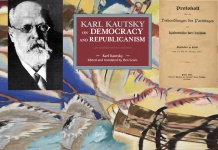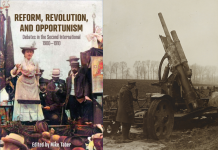American socialist Paul Le Blanc responds to a recent article from Charlie Post as part of a continuing debate about Lenin and Leninism
As the radicalisation process works its way through the diverse and recomposing working class of our planet, young activists (as well as the not-so-young) continue to wrestle with questions of how best to understand and change the world. Particularly important are discussions and debates among growing numbers of critical-minded Marxists wrestling with perspectives on strategy, tactics and organization, all this amid the fluidity and crises of twenty-first century capitalism.
Among those in the forefront of such efforts is my long-time comrade Charlie Post, and both of us would agree – I think – that differences we have expressed regarding what each has advanced in recent years are offered within a broader context of agreement on general revolutionary socialist perspectives. Some disagreements with Charlie, expressed in my recent book Unfinished Leninism, have brought an explicit response in his recent essay “Leninism?“. As usual, there is much in what he writes with which I can agree, but also there are aspects of what he has to say that I believe are wrong.
What Post Says
In particular, he repeats earlier assertions that: (1) Vladimir Ilyich Lenin – leader of Russia’s Bolshevik Revolution of 1917 and a central founder of modern Communism – had little distinctive to say as a Marxist theorist, that “quite simply, Lenin was a quite orthodox follower of Karl Kautsky, the premier theorist of pre-war social-democracy, in matters of both socialist politics and organization”; (2) there is therefore no distinctive “Leninism” that can be traced to Lenin’s own political thought, this being instead an artificial construct of such political inferiors as Gregory Zinoviev and Joseph Stalin; and (3) Ernest Mandel, the late central theoretician of the Fourth International (a mentor of both Post and myself, among many others), advanced an “explanation of reformism [that] owes more to Luxemburg than to Lenin” (adding that “Mandel explicitly rejects Lenin’s theory of the labor aristocracy in both ‘Leninist Theory’ and in his essay ‘What is the Bureaucracy?’ . . . and embraces Luxemburg’s analysis of the labor officialdom”).
These first two points are discussed at length my Unfinished Leninism. The argument will be developed further in a forthcoming survey of major works on Lenin by Tamás Krausz, Antonio Negri, August Nimtz, John Riddell, and Alan Shandro. Here I will simply assert that (a) Post seriously overstates the identity of Lenin’s Marxism with Kautsky’s, (b) there was far more to Lenin’s political thought, and far richer contributions that he offered, from the 1890s to the early 1920s, than Post seems inclined to recognise, and (c) the term Leninism can validly be used to refer to Lenin’s own political thought and practice. In fact, I don’t believe serious revolutionary activists of today and tomorrow, if they truly wish to advance the cause of revolutionary socialism, can afford to shrug off such Leninism in the manner that Post seems to.
What I want to do here, however, is focus on the thought of Ernest Mandel – in part because I think Post’s summary is seriously inaccurate, but especially because I believe that Mandel’s writings, if seriously engaged with, can be a valuable resource for those prepared to commit their lives to changing the world.
What Mandel does not say
There is sometimes a tendency – when one is reading especially stimulating works by Someone Else, to be inspired to do one’s own thinking about the topic under discussion, to come up with new ideas of one’s own, and then to mistakenly attribute such new ideas to the Someone Else that one is reading. I am wondering if that might be the case with Charlie Post as he attributes his own thoughts to Ernest Mandel. In fact, I believe Post’s contribution is more original than he himself seems inclined to recognise.
Contrary to Post’s assertions, Mandel does not embrace his flat-out rejection of the conception of labor aristocracy. He addresses this conception, as Post notes, in “The Leninist Theory of Organization,” though the reference is fleeting, in end note 45, where – after noting that in Left-Wing Communism, An Infantile Disorder, Lenin asserts (in Mandel’s summary) that “the building of the revolutionary class party is the process whereby the program of the socialist revolution is fused with the experience that a majority of the advanced workers have acquired in struggle”. Mandel writes:
This conclusion was, superior to that of Trotsky in 1906 or Luxemburg in 1904. In the face of a growing conservatism on the part of the social-democratic apparatus, they had illusions about the ability of the masses to solve the problem of the seizure of power with the aid of their revolutionary ardor alone. In The Mass Strike, the Political Party and the Trade Unions, (in Rosa Luxemburg Speaks, pp.153-219) Luxemburg even shifts the problem temporarily onto the “unorganized,” i.e., the poorest, section of the proletariat that for the first time attains consciousness during a mass strike. In his writings after 1914 Lenin too explicitly contrasts these masses to the “labor aristocracy,” in a somewhat oversimplified manner, in my opinion. At that time the workers in the large steel and metal processing plants, among others, belonged to the unorganized sectors of the German proletariat, and while they turned to the left en masse after 1918, they did not at all belong to the “poorest” layers.[1]
Rather than a rejection of the labor-aristocracy concept, we find a contextualization in which a more nuanced utilisation is called for. The same thing happens in Mandel’s essay “What is the Bureaucracy?” in Tariq Ali’s anthology The Stalinist Legacy. He writes that “it is difficult to explain the nature of the trade-union bureaucracy in the United States solely by the existence of a ‘labor aristocracy’ corrupted by colonial super-profits.” It cannot be explained solely by the notion of a bought-off labor-aristocracy. (In the essay Mandel also makes qualifying points that the bureaucratic-conservatism of trade union bureaucracy is partly explained by its specific function in the capitalist economy, and also that, historically, better-paid and more skilled workers are often among the most militant and class-conscious sectors of the proletarian vanguard.) The point that Mandel makes almost immediately after, however, is almost like a pie in the face of Post’s dismissal of the labor-aristocracy concept:
When we examine the economic conditions of existence of the working class throughout the world, we see that the real ‘labor aristocracy’ is no longer constituted inside the proletariat of an imperialist country but rather by the proletariat of the imperialist countries as a whole in relation to that of the colonial and semi-colonial countries. For example, the wage of an English worker is ten times larger than the wage of a black South African worker, while the wage differential of two English workers is 1:2 at most. Imperialist exploitation has produced a tremendous wage differential between the workers of imperialist and underdeveloped countries and this factor plays a significant role in the political corruption of certain layers of the proletariat inside the advanced capitalist countries.[2]
Simply because Mandel is saying some things that go in a different direction from Post’s argument on the labor aristocracy does not necessarily mean that Post’s argument is wrong. Where he is wrong, however, is in attributing his argument to Mandel (at least in the two sources he cites).
Making Sense of Luxemburg and Lenin
In his essay “The Leninist Theory of Organization,” Mandel argues that “Lenin’s theory of organization is, in fact, above all a theory of revolution,” adding that “to have misunderstood this is the great weakness of Rosa Luxemburg’s polemic against Lenin in 1903-1904,” and he goes on to emphasize in more than one way “how utterly wrong she was in this debate.” Far from counterposing Luxemburg’s analysis of reformism to Lenin’s, however, Mandel argues that their approach was much the same. Agreeing that capitalism and the bourgeois state could not “be gradually dismantled, as for instance a wall can be taken apart brick by brick, . . . the ideological essence of the reformism and revisionism [was] rejected by Luxemburg and Lenin with equal passion.”[3]
The revolutionary conquest of state power by the working class was seen by both Lenin and Luxemburg as “an objective for the near or not-too-distant future,” yet this meant that revolutionaries were “immediately confronted with the question of the means necessary for achieving the revolutionary conquest of power.” Actually, Mandel is sharply critical of Luxemburg because she “misconstrued the import of Lenin’s purely polemical use of the notion of ‘Jacobins inseparably linked to the organization of the class-conscious proletariat'” – a formulation which caused her (perhaps a bit demagogically) to attack Lenin for idolizing “bourgeois revolutionaries” rather than proletarian ones. Mandel explains: “What Lenin meant with this idea was certainly not a band of Blanquist conspirators but an advanced group oriented, like the Jacobins, toward an unremitting attempt to carry out the revolutionary tasks, one that does not permit itself to be diverted from concentrating on these tasks by the inevitable conjunctural ebb and flow of the mass movement.”[4] At the same time, he went on, in turn, to insist:
to do justice to Luxemburg it must be added that, in the first place, she took up – in fact had to take up – this question from a different historical viewpoint since, by 1904, she was already influenced more by German than by Russian or Polish reality; and second, that she completely drew the necessary conclusions in the Leninist sense as soon as it became clear that in Germany, too, the coming of the revolution was an immediate possibility.[5]
It is difficult to see in Mandel’s essay how one can argue that he is advancing an “explanation of reformism [that] owes more to Luxemburg than to Lenin.” Nor does there seem to be a tilt away from Lenin in other aspects of “The Leninist Theory of Organization.” There is an embrace of both of these revolutionaries, and – if anything – a more critical attitude toward Luxemburg than to Lenin.
It is noteworthy that Mandel indignantly rejects the common counterposition of Luxemburg’s alleged “spontaneism” to Lenin’s insistence on organizational centralization. “Lenin welcomed huge, spontaneous outbreaks of mass strikes and demonstrations just as enthusiastically and just as explicitly as Rosa Luxemburg and Trotsky. Only the Stalinist bureaucracy falsified Leninism with its increasing distrust of spontaneous mass movements – which after all is characteristic of any bureaucracy.” He goes on to argue: “The difference between the Leninist theory of organization and the so-called theory of spontaneity – which can be attributed to Luxemburg only with important reservations – is thus to be found not in an underestimation of mass initiative but in an understanding of its limitations.”[6]
Mandel’s insistence that “Lenin’s concept of organization in reality represents a concept of the current potential for proletarian revolution” is related to “the central factor in the Leninist theory of proletarian, class consciousness: the problem of the definition of the revolutionary subject under capitalism.” He noted that “for Marx and Lenin (as well as for Luxemburg and Trotsky, although they did not draw all the necessary conclusions from this fact until some time before 1914), the revolutionary subject is the only potentially, only periodically revolutionary working class as it works, thinks and lives under capitalism, i.e., in the totality of its social existence.”[7]
In Mandel’s interpretation, Kautsky is hardly the touchstone for Lenin’s thinking on such matters – nor is Luxemburg the touchstone for Mandel’s thinking here (although Lenin respected the early Kautsky just as Mandel greatly respected Luxemburg). But here is how he himself puts it:
The Leninist theory of organization proceeds directly from this assessment of the position of the revolutionary subject, for it is self-evident that a subject, thus defined, can only be a contradictory one. On the one hand it is exposed to wage slavery, alienated labor, the reification of all human relations, and the influence of bourgeois and petty-bourgeois ideology. On the other hand, at periodic intervals it passes over into a radicalizing class struggle, and even into open revolutionary battle against the capitalist mode of production and the bourgeois state apparatus.[8]
There is not any inclination on Mandel’s part to denigrate Luxemburg in order to beat the drums for Lenin. Rather, understanding and changing the world are seen as complex and interconnected processes, necessarily involving the efforts and insights of more than one revolutionary:
The Leninist theory of organization represents, then, broadly speaking, the deepening of Marxism, applied to the basic problems of the social superstructure (the state, class consciousness, ideology, the party). Together with the parallel contributions of Rosa Luxemburg and Trotsky (and, in a more limited sense of Lukács and Gramsci), it constitutes the Marxist science of the subjective factor.[9]
What to do
I imagine the Charlie Post will agree with much, if not all, of what is offered here. And others will also need to get into the act of clarifying the specifics of Lenin’s thought and practice (as, for example, Krausz, Negri, Nimtz, Riddell, Shandro and others do in recently published studies). Sorting things out, both in regard to theory and practical politics, will necessarily be a collective process now as in the past.
By quoting Ernest Mandel here, the only thing that has been clinched is what Mandel actually said. There may be insights and ideas in what he said that can be useful for us as we seek to understand history and struggle for a better future. On the other hand, there might be different insights and ideas that might be no less useful.
Such insights and ideas must obviously be tested in practice, in actual struggles against the various manifestations of capitalist oppression and for the forward movement of socialist organization within the working-class majority, if they are to help us figure out what to do.
[1] Ernest Mandel, “The Leninist Theory of Organization,” Revolutionary Marxism and Social Reality in the 20th Century: Collected Essays, ed. Steve Bloom (Atlantic Highlands, NJ: Humanities Press, 1994), 97, 122. This and much more of value by and about Mandel can be found at the Ernest Mandel Internet Archive: http://www.ernestmandel.org/en/index.html.
[2] Ernest Mandel, “What is the Bureaucracy?,” The Stalinist Legacy, Its Impact on Twentieth-Century World Politics, ed. Tariq Ali (Chicago: Haymarket Books, 2013), 75-76.
[3] Mandel, “The Leninist Theory of Organization,” 87, 89-90.
[4] Ibid., 90.
[5] Ibid.
[6] Ibid., 91-92.
[7] Ibid., 103.
[8] Ibid.
[9] Ibid., 80.




















